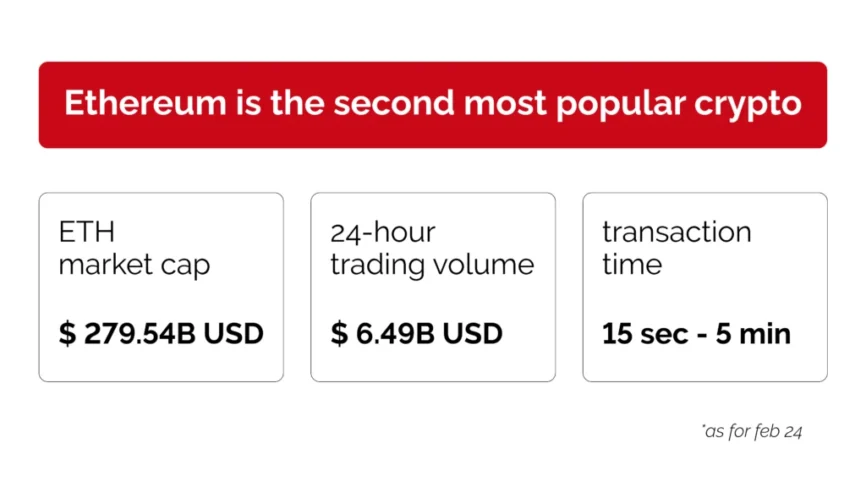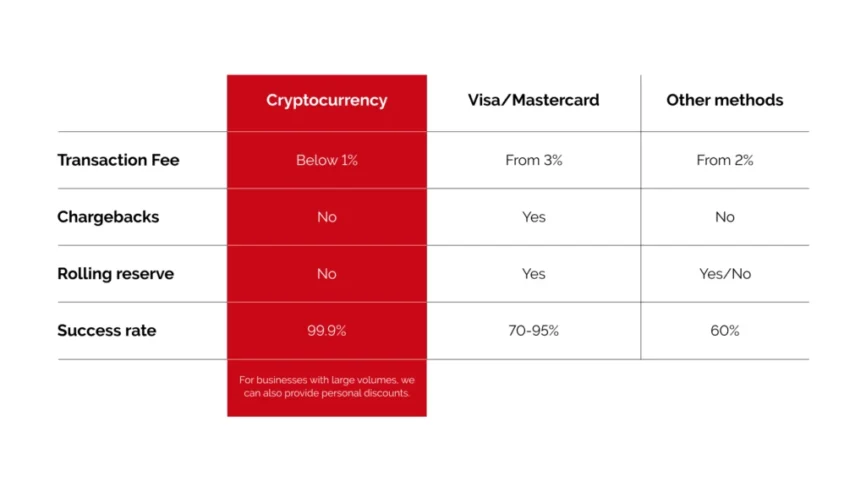Accept Ethereum (ETH) Payments as a Business
Accepting Ether (ETH) as a payment method is a strategic move for businesses looking to stay ahead of the curve. This decision unlocks a wealth of new opportunities by opening up your customer base to a wider audience of cryptocurrency users. ETH, being the second largest cryptocurrency by market capitalization after Bitcoin, is a popular choice for many crypto users.
By accepting Ether (ETH) on your website, you can provide a faster and more secure payment option, positioning your business at the forefront of the digital payment revolution.
What Is the Ethereum?
Ethereum (ETH) is a decentralised blockchain platform that is open-source and supports its own cryptocurrency, Ether. It serves as a foundation for various other digital currencies and facilitates secure transactions through the operation of decentralised smart contracts.
Initially proposed in late 2013, Ethereum’s development was funded through crowdfunding in 2014, culminating in its official release in July 2015. Differing from Bitcoin, which is mainly a digital currency, Ethereum offers a broader scope as a platform. It allows developers to create and implement decentralised applications (dApps) and smart contracts. These smart contracts execute automatically, embedding the terms of the agreement between the parties in the code. They activate on their own once the preset conditions are fulfilled, eliminating the need for intermediaries.
Ether, the intrinsic digital currency of Ethereum, serves dual purposes: as a digital currency akin to Bitcoin and as a form of ‘gas’ that powers smart contracts and dApps. This ‘gas’ compensates for the computational power necessary to operate an app or execute a contract on Ethereum.
The Ethereum blockchain is distinguished from other crypto payments by its Ethereum Virtual Machine (EVM), a decentralised Turing-complete virtual machine. The EVM allows for running complex contracts and decentralised apps.
A significant development in Ethereum’s evolution is its transition from a proof-of-work (PoW) consensus model to a proof-of-stake (PoS) framework in the Ethereum 2.0 update. This shift aims to improve network scalability, security, and environmental sustainability, leading to higher energy efficiency and increased transaction processing capacity.
Ethereum has been instrumental in the rise of the Initial Coin Offering (ICO) movement and has established itself as a critical platform for decentralised finance (DeFi) and the creation of Non-Fungible Tokens (NFTs), contributing to its high valuation and strong position in the cryptocurrency market.

What is the ETH Payment Method?
Ethereum payment offers vendors the ability to accept ETH, a major cryptocurrency, as a form of payment for products or services. Ethereum ranks as the second most significant cryptocurrency globally and serves as a foundational platform for creating a wide range of decentralized applications (dApps).
Here’s how it works:
- Wallet Setup: Both the payer and the receiver need to have Ethereum wallets.
- Payment Processing: When a customer chooses to pay with Ether, they initiate a transaction from their Ethereum wallet to the merchant’s wallet address. The transaction is recorded on the Ethereum blockchain, ensuring transparency and security.
- Ethereum Payment Gateway Integration: Businesses can integrate Ethereum payment gateway services into their websites to accept Ethereum payments. This includes setting prices in ETH, monitoring wallets, and ensuring wallet security.
- Smart Contracts: Smart contracts can be utilized to automate and enforce the payment process. For example, a smart contract can automatically release goods or services once payment is confirmed, reducing the need for intermediaries.
Benefits of Accepting Ethereum (ETH) as a Business
Fast and Global Transactions. Ethereum transactions are processed quickly, often within seconds or minutes. As a global blockchain network, Ethereum enables businesses to accept payments from almost anywhere in the world without the delays associated with traditional banking systems.
Reduced Transaction Costs. Ethereum can significantly reduce transaction fees compared to conventional payment methods, especially for cross-border transactions. This is due to its decentralised nature, which eliminates the need for intermediaries like banks.

Increased Security with Smart Contracts. Ethereum’s use of smart contracts adds a layer of security and trust to transactions. Smart contracts are self-executing contracts with the terms of the agreement directly written into code. They automatically enforce and execute the terms of a contract when certain conditions are met, reducing the risk of fraud and default.
Enhanced Privacy and Transparency. Transactions on the Ethereum blockchain are secure, transparent, and immutable. While they provide a transparent transaction history, they also maintain the privacy of the parties involved, as personal information is not required.
Many businesses have leveraged Ethereum’s privacy features to appeal to a privacy-conscious clientele, indicating the potential benefits of accepting Ethereum.
Attracting a New Customer Base. Accepting Ethereum can attract customers who prefer using cryptocurrencies for their transactions, tapping into a market segment that is growing rapidly.
Types of Companies Accepting Ethereum Payments
- E-commerce Platforms: Online retailers and service providers accept Ethereum to offer customers a more versatile and potentially cheaper payment option.
- Gaming Industry: Many online gaming platforms and services accept Ethereum through gaming payment gateways, leveraging its ability to handle microtransactions and smart contract functionalities for in-game purchases and rewards.
- Forex Platforms: Cryptocurrency exchanges and Forex platforms use Ethereum for its fast transaction capabilities and its popularity among traders.
- Betting and Gambling Sites: Online betting and gambling platforms favour Ethereum for its anonymity and security, providing users with a secure way to place bets.
Getting Started with CryptoProcessing
Indeed, it’s likely that if your business lies within one of the categories above, the various ETH payment processing benefits we described are ready for the taking. All that’s left to do is to take the first step with CryptoProcessing.com, and your first crypto payments processing integration will be up and running in a matter of weeks. To incorporate Ethereum (ETH) into your payment systems through CryptoProcessing.com, the process is tailored for ease of use and efficiency:
- Start by filling out an on-site request so that our team knows to get in touch with you.
- Seamlessly integrate advanced API into your existing checkout system. This integration process is made simple with the CryptoProcessing’s support of the experienced technical team.
- Start accepting Ethereum (ETH) payments and benefit from CryptoProcessing.com’s instant conversion feature. This allows you to receive funds in your preferred currency, facilitating a smoother financial operation.
By following these steps, businesses can smoothly start accepting crypto payments and using CryptoProcessing’s services to accept Ethereum, ensuring a secure, rapid, and flexible cryptocurrency payment process and system that is in tune with the demands of modern financial transactions.
Summing up – Why is CryptoProcessing the Best Choice for Ethereum transactions?
There are plenty of ETH payment providers on the market, but when the top payment gateway by transaction volume is also one of the most consumer-friendly and cost-effective, there’s no need to settle for less than the best. Here’s a taste of what you can expect from CryptoProcessing.com:
- Multifaceted Payment Options: CryptoProcessing offers diverse choices for accepting Ethereum payments. This includes Payment Links, detailed Invoices, and flexible Channel Deposits, catering to various business models and customer preferences.
- Instantaneous Conversion: The platform provides rapid conversion services, enabling merchants to immediately exchange Ethereum into fiat currencies or other cryptocurrencies. This feature helps in capitalising on the best rates and maintaining financial stability.
- Robust Security and Compliance: With a commitment to security, CryptoProcessing.com protects transactions with advanced encryption and adheres to stringent compliance measures. This ensures a trustworthy and secure environment for all Ethereum transactions.
If you’re interested in taking advantage of the myriad of benefits available for businesses that accept payments in Ethereum, book a call with a specialist over at the CryptoProcessing team today.
the second-largest cryptocurrency
by market capitalization.
Accept Ethereum Payments FAQs:
What Is Ethereum And How Is It Different From Bitcoin?
Ethereum is a blockchain platform with its own cryptocurrency, Ether. Unlike Bitcoin, which is mainly a digital currency supposed to provide alternatives for physical and fiat currencies, Ethereum also enables decentralised applications and smart contracts.
What Fees Are Involved In Processing Ethereum Payments?
Ethereum transactions require ‘gas’ fees, which vary based on network congestion and transaction complexity. The processing fee can vary depending on the payments provider – with CryptoProcessing.com, you can expect fees as low as 1%.
How Fast Are Ethereum Transactions Processed?
Ethereum transactions typically take a few seconds to minutes, depending on network congestion and gas fees.
Can I Convert Ethereum To My Local Currency Automatically?
Yes. With CryptoProcessing.com, automatic fiat conversions are part of the service.
How Do I Handle Refunds With Ethereum Payments?
Refunds must be manually processed by sending a new Ethereum transaction to the original payer.
Does Anyone Already Accept Ethereum?
Yes, a number of companies, such as Overstock, Shopify, Travala, Gipsybee, Sotheby’s, Crypto Emporium, NordVPN, Chipotle, Twitch and Pacaso accept Ethereum as payment.
If you need more help or have questions about how to add our service to your work, our team is ready to help you. You can ask for help by filling out the contact form, sending us an email at [email protected], or messaging us on Telegram. We’re here to help you.



